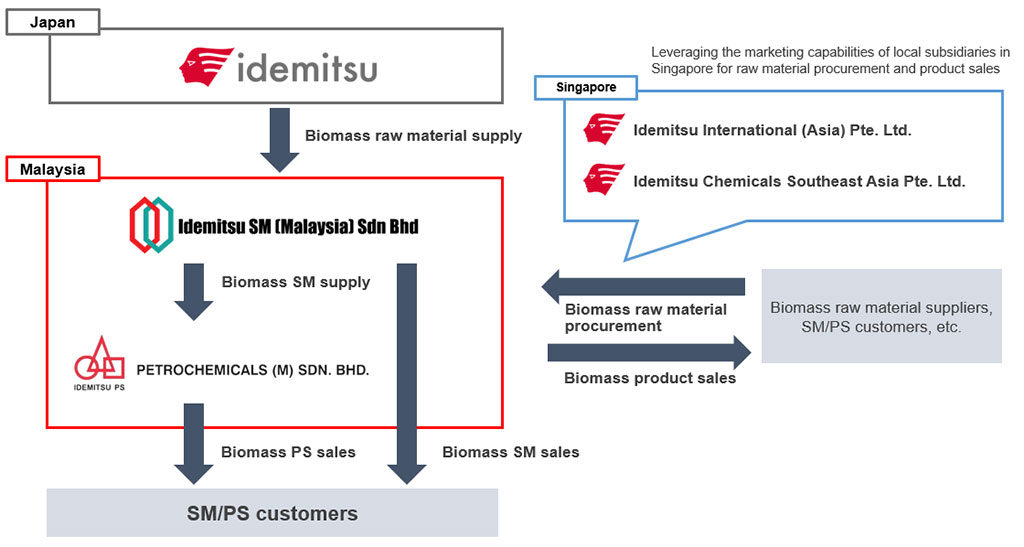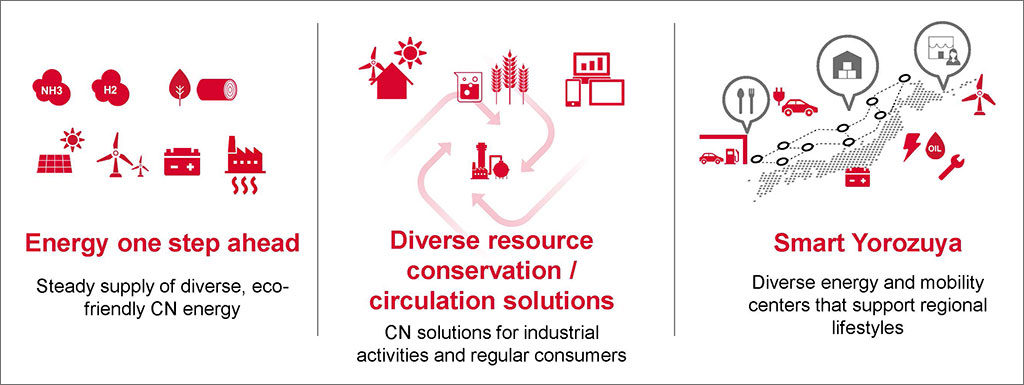News
2023/4/25
Obtainment of 'ISCC PLUS Certification' for Chemical Production in Malaysia -Toward the Establishment of a Supply Chain for Styrene-based Biomass Plastics in Southeast Asia-
Idemitsu SM (Malaysia) Sdn. Bhd. (Location: Pasir Gudang, Johor, Malaysia; hereinafter “ISM”) and Petrochemicals (Malaysia) Sdn. Bhd. (hereinafter “P(M),” location as above), subsidiaries of Idemitsu Kosan Co., Ltd. (Head Office: Chiyoda-ku, Tokyo; Representative Director, President and Chief Executive Officer: Shunichi Kito, hereinafter “Idemitsu Kosan”), have successfully obtained the ISCC PLUS certification, an international certification system for sustainable products, for the production of styrene monomer*1 (“SM”) and polystyrene*2 (“PS”).
In addition to supplying biomass feedstocks from Idemitsu Kosan to ISM, the project aims to the supply chain for styrene-based biomass plastic in Southeast Asia by procuring various biomass feedstocks and selling biomass products in cooperation with the subsidiaries located in Singapore.

ISCC PLUS certification is an international system that manages and ensures the supply chain of products made from sustainable raw materials such as biomass and, allows to apply the mass balance method*3. Biomass naphtha, the raw material for biomass products, is manufactured from raw materials derived from renewable materials such as plants, and thus can reduce CO2 emissions compared to naphtha derived from petroleum.
Idemitsu Kosan will supply biomass naphtha-derived feedstocks to ISM to produce biomass SM based on the mass balance method under ISCC PLUS certification. Similarly, the adjacent P(M) will produce biomass PS from the biomass SM supplied by ISM. This will allow us to establish the supply chain of styrene-based biomass plastics from Japan to Malaysia.
To ensure the stable supply of styrene-based biomass products in Southeast Asia, ISM and P(M) will stably procure the various biomass feedstocks and manufacture/sell biomass products utilizing the marketing capabilities of Idemitsu International (Asia) Pte. Ltd. (Singapore), trading of petroleum and related products, and Idemitsu Chemicals Southeast Asia Pte. Ltd. (Singapore), sales of petrochemical products in southeast area.
Toward the realization of a carbon-neutral society by 2050, Idemitsu Kosan has set forth its vision for 2030, “Your Reliable Partner for a Brighter Future,” and its vision for 2050, “Shaping Change.” In the Medium-term Business Plan (fiscal years 2023-2025) announced last November, we expressed our commitment to fulfill our “Responsibility to support people and their daily lives” and “Responsibility to protect the global environment now and in the future” through social implementation in the following “3 business domains.”

This initiative is positioned as an important effort toward social implementation of “Diverse resource conservation / circulation solutions.” By supplying biomass products, an area of growing interest, we aim to contribute to the reduction of environmental impact. In the fast-developing Southeast Asia, our group companies will cooperate to build a supply chain of biomass plastics with the aim of achieving a carbon-neutral and recycling-oriented society.*1: Styrene monomera type of aromatic hydrocarbon with a structure in which one hydrogen atom of benzene is replaced by a vinyl group. Existing in nature as a natural substance, styrene monomer is generally produced through a chemical reaction between ethylene and benzene obtained from crude oil or naphtha. Raw material for polystyrene and ABS (acrylonitrile butadiene styrene resin).*2: PolystyreneA thermoplastic polymer made from styrene monomer, polystyrene is known as one of the five major general-purpose resins along with polyethylene (two types: high-density and low-density), polypropylene, and polyvinyl chloride. There are two main types of polystyrene: general-purpose polystyrene (GPPS), which is characterized by its high transparency and hardness, and milky white high impact polystyrene (HIPS), which has improved impact resistance by adding rubber components.*3: Mass balance methodA method in which raw materials with certain characteristics (e.g., biomass-derived raw materials) are mixed with other raw materials (e.g., petroleum-derived raw materials) in the processing and distribution process from raw materials to finished products, and the characteristics are assigned to a portion of the product in accordance with the input-amount of raw materials with those characteristics. In the chemical industry, where the products are manufactured through multiple production processes, the mass balance method is considered an effective approach of accelerating the spread of biomass products in the supply chain.
- Category
- Headline News

